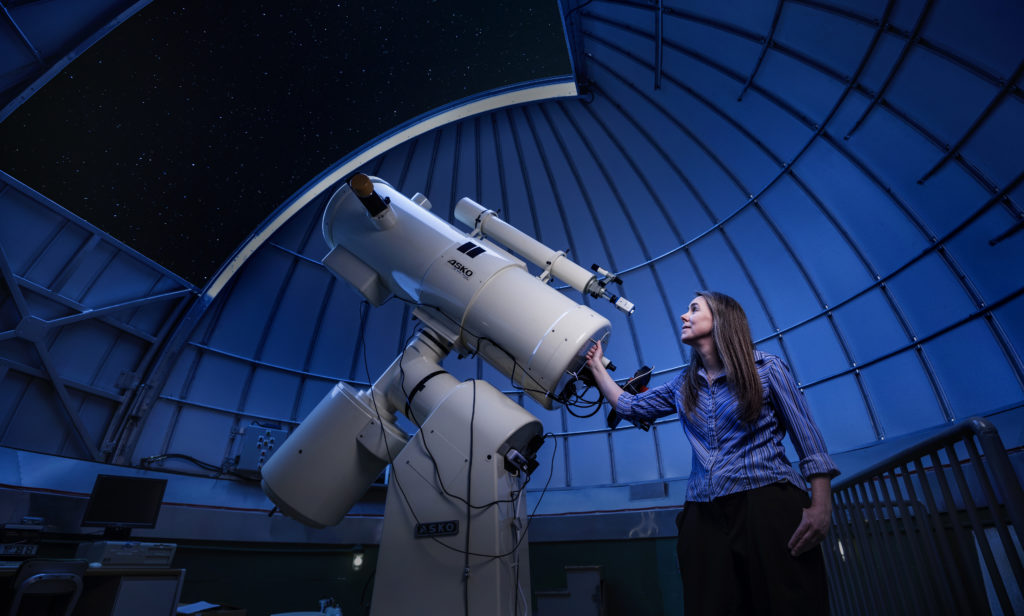
Denise Stephens’ first day on the BYU campus was a landmark day for the physics and astronomy department: Until that point, department administrators had never hired a female faculty member.
Although her experiences at BYU and in her department have been positive, there have been times where Stephens didn’t feel one hundred percent at home. That all changed when she started attending BYU’s Faculty Women’s Association (FWA) meetings and activities.
“It helps with the imposter syndrome,” Stephens said. “BYU can feel like a very isolating place, going to FWA is a way to escape the isolation and to interact with other women who will understand and who will listen and who will support (me).”
FWA has allowed Stephens to connect with a community of women across campus that stretches all the way from vice presidents and deans to staff members and other female faculty. “I feel more integrated in the university as a result,” she said.
One of the biggest benefits Stephens has taken away from attending FWA events was the mentorship she received during the organization’s annual rank and status meetings. Rank and status is BYU’s version of tenure, and applying for full professorship involves hundreds of pages of documents illustrating everything from research and teaching to a person’s citizenship.
The meetings are divided into separate groups — those without continuing faculty status, those with CFS, full professors and administrative employees — so members can go to the section that is relevant to their situation.
Stephens said documents provided to faculty about rank and status are not very specific, so having the opportunity to get personalized feedback was crucial in helping her feel confident about her portfolio.
“I wasn’t caught off guard,” she said.”(It was) good to talk to other women going through the same process, having the same concerns and especially able to raise concerns for women that maybe men don’t always think about, like how do I deal with a pregnancy?”
Bonnie Anderson, the BYU Information Systems department chair, has also seen the benefits of FWA rank and status meetings.
“The women who have made it through the process help encourage, sometimes with very detailed steps, the more junior women about how to make it through the process and plan for the future,” Anderson said. “The shared experiences of women, such as caregiving or extra committee work, are more valuable than the general tips provided by the Faculty Center.”
The friendships Anderson has made during the 19 years she’s participated in FWA are another benefit she’s seen. “It was so great to meet women who could be a mentor to me, bringing experiences that my male colleagues just wouldn’t have.”
She said the organization helps provide women with a network that men may receive through more informal communities, such as BYU ward callings or pick-up basketball games.
“Women have different experiences than men. It is crucial to have role models and mentors who have shared experiences,” she said.
Connie Lamb, a senior librarian whose fields of specialty include women’s studies, has been a part of FWA since its founding in 1994.
“When we started FWA, the organizing committee decided we wanted to be independent,” Lamb said. “We’re not beholden to any administration on campus.”
This independence means the organization does not receive any funding. Because of this, members are required to pay dues to fund activities. It also means that any decisions regarding the group are made by the FWA board.
For Lamb, the years in FWA have resulted in numerous friendships. “It’s the people that make it worthwhile,” she said. “I’ve just loved being able to say hi to someone from a different department when I’m walking across campus.”
She has also been able to see how the organization has grown and developed over the years.
“It’s been amazing how well this group has continued,” she said. “I’m actually surprised at times how other women have stepped in and done a great job as officers and continue to grow the FWA.”
One of the women who has stepped up to the plate is current FWA President Julie Damron. She said the group is aimed at supporting female colleagues throughout the campus, connecting them with each other and potentially doing research together.
“Sometimes as a female faculty member on campus, you feel a little bit isolated if you’re in a department where you have 25 men and two women, and it just helps me realize that there are women who are rooting for me and cheering for me and there to support me, and I’ll do the same for them,” Damron said.
She said the organization’s activities, which include opening socials, retreats, lunches, lectures and QPR (Question, Persuade and Refer) suicide prevention trainings, are beneficial to everyone.
“My favorite part is the connections that I make across campus with people that I would not know if we weren’t a part of this organization,” she said. “This meeting brings us all together and makes us aware of each other and concerned for each other.”
One of the changes she has integrated during her presidency is broader inclusion for women in administrative and staff positions. One of these women is Education in Zion Exhibit Curator Heather Seferovich.
Seferovich said she believes it’s important to have a female-centered group on campus like the FWA.
“I’ve heard that about a fifth of the university faculty are women and just over a quarter of the administrators are women. Knowing and interacting with these colleagues through FWA has been valuable personally and professionally,” Seferovich said.
Her advice to women who are considering joining FWA is to take the plunge and start coming to meetings.
“It’s often a challenge for many of us to make time for one more thing on our calendars. But after attending an FWA meeting, I never regret having gone, and my life is far richer for the friendships that I’ve developed there,” she said.




